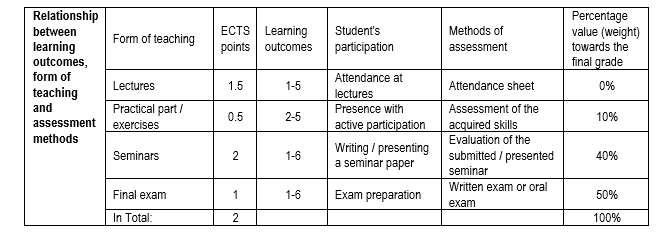The objective of this course is to teach students to critically evaluate existing scientific evidence, design and report the results of scientific work, to understand clinical practice guidelines as prerequisites for evidence-based physical therapy practice.
Students will also be taught specific competencies:
Use of clinical guidelines and evaluation of results of evidence-based physical therapy practice.
Find scientific evidence in databases and review articles.
A critical assessment of scientific evidence in relation to the selection of samples, type of study and statistical analysis; critical assessment of protocols, measurement characteristics and measuring devices.
Definition of scientific problem and diagnosis; understanding of ethical problems in clinical practice; ability to prepare project applications.
Performance of oral presentations and reporting results for conferences and scientific publications.
Evidence-based physical therapy practice: evidence-based historical development of medicine, meaning of scientific evidence in clinical practice, clinical guidelines as a source of evidence-based physical therapy.
Search for existing scientific evidence: search strategies, databases, literature review, access to the full text of scientific work.
Overview of common errors in statistical analysis (sample size, meta-analysis, research and confirmatory approach, statistical and clinical significance, multigroup and subgroup analysis problems, correlation and sampling).
Critical assessment (quality and relativity) of scientifically proven treatment, clinical observations, prognosis, diagnosis and cause, sample selection, monitoring of experimental states, variability of clinical researches (case review, group comparison, randomisation, prospective and retrospective studies, cohort research, cross-sectional studies).
Critical assessment of measurement characteristics and analysis devices in scientific papers and clinical practice (reliability, sensitivity, validity, measurement errors).
Defining the scientific problem and setting the hypothesis. Ethical issues in scientific research.
Project application, possible sources of funding for scientific work.
Structure and writing of scientific research: case presentation, articles, preparation of oral or poster presentations for conferences or lectures.
Presentation of results in research and clinical practice (cognitive and perception processes, examples of graphic interpretation, good and bad examples).
Implementation of evidence-based practice and detection of its effectiveness.
Obavezna literatura:
Herbert R, Jamtvedt G, Birger Hagen K, Mead J. Practical Evidence-Based Physiotherapy. Edinburgh, UK: Elsevier/Churchill Livingstone; 2011.
Prezentacije i bilješke s predavanja
Dopunska literatura:
Law M, MacDermid J, ur. Evidence-Based Rehabilitation: A Guide to Practice. 2. izd. Thorofare, New Jersey, SAD: Slack; 2008.
Hicks CM. Research Methods for Clinical Therapists: Applied Project Design and Analysis. Edinburgh, UK: Elsevier/Churchill Livingstone; 1999.
Gross Portney L, Watkins MP. Foundations of Clinical Research: Applications to Practice. New Jersey, SAD: Prentice Hall Health; 2009.
Lawer Fawcett AJ. Principles of Assessment and Outcome Measurement for Occupational Therapists and Physiotherapists: Theory, Skills and Application. New York, SAD: John Wiley; 2007.
Freeman JV, Walters SJ, Campbell MJ. How to Display Data. Oxford, UK: Blackwell BMJ Books; 2008.
Upon completion of this course, students will be able to:
- understand the meaning of practical evidence-based physiotherapy and the meaning of guidelines in clinical practice
- analyze existing scientific evidence
- critically evaluate scientific research
- prepare a project proposal
- apply knowledge from scientific databases at work in clinical practice
- demonstrate their scientific research results orally and in writing



